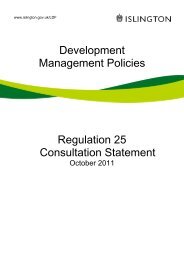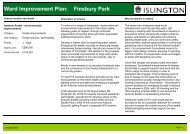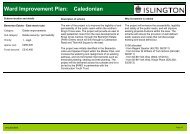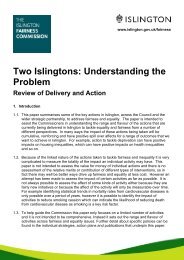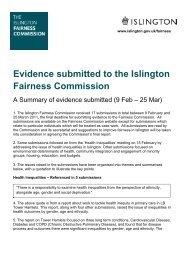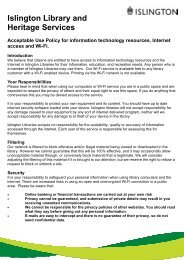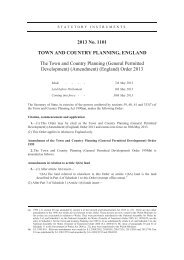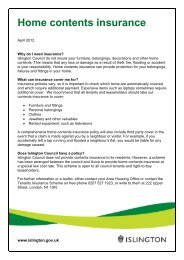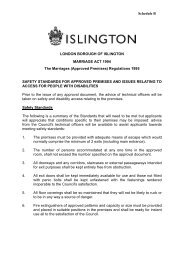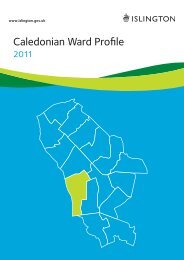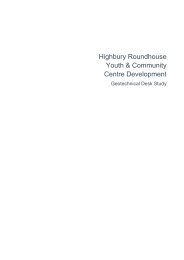Development Management Policies - Direction of ... - Islington Council
Development Management Policies - Direction of ... - Islington Council
Development Management Policies - Direction of ... - Islington Council
You also want an ePaper? Increase the reach of your titles
YUMPU automatically turns print PDFs into web optimized ePapers that Google loves.
3 Managing Environmental Resources<br />
no connection to a Decentralised Energy Network. The preferred energy strategy shall be<br />
enacted, unless it is not reasonably possible to connect to a Decentralised Energy Network,<br />
in which case the alternative energy strategy shall be enacted.<br />
3.0.19 Part A <strong>of</strong> the policy requires developments to have the ability to connect to a DEN, which<br />
means that developments have the ability to be connected to a network if/when such a<br />
network becomes available in the future, rather than necessarily connecting at the time<br />
<strong>of</strong> construction. Whether minor developments can reasonably be designed to be able to<br />
connect to a DEN will be assessed by the council, taking into account a range <strong>of</strong> factors,<br />
including size, location, use and design <strong>of</strong> the development. Specific design standards<br />
to enable connection and future connection will be set out in the Sustainable Design SPD.<br />
3.0.20 All developments within 500 metres <strong>of</strong> an existing or planned DEN, or minor developments<br />
within 100 metres <strong>of</strong> an existing network, are required to submit a feasibility assessment<br />
<strong>of</strong> connection to that network, to determine whether connection is reasonably possible.<br />
The council, or relevant Energy Service Company, will provide relevant information to<br />
inform the feasibility assessment, including an assessment <strong>of</strong> the approximate cost <strong>of</strong><br />
connection. Where connection is not considered technically possible or is not considered<br />
possible for non-technical reasons, including financial viability, the alternative energy<br />
strategy is required to be enacted. Feasibility assessments should consider a range <strong>of</strong><br />
factors, including:<br />
d. the size <strong>of</strong> the development, and the heat load and energy demands;<br />
e. the distance to network pipes;<br />
f. physical barriers e.g. roads and railways, and<br />
g. other developments in the vicinity that may also be required to connect to the network.<br />
3.0.21 Where connection to a network is deemed to be reasonably possible, the anticipated CO 2<br />
reductions to be achieved by connection to the network shall contribute to the total CO 2<br />
reduction target, which shall be at least 50%, compared with total emissions from a building<br />
that complies with 2006 Building Regulations Part L. The CO 2<br />
reductions anticipated from<br />
connection shall be assessed and agreed by the council. Other measures proposed to<br />
contribute to the relevant CO 2<br />
reduction target shall be complementary with network<br />
connection technologies and/or with SHN and/or CHP technologies, in order to achieve<br />
maximum reasonable carbon dioxide reductions.<br />
3.0.22 Where connection is not considered reasonably possible, due to technical or non-technical<br />
reasons, including financial viability, an alternative energy strategy is required to be enacted.<br />
This strategy should achieve at least a 40% reduction in CO 2<br />
emissions, compared with<br />
total emissions from a building that complies with 2006 Building Regulations Part L.<br />
30<br />
<strong>Islington</strong> <strong>Council</strong> <strong>Development</strong> <strong>Management</strong> <strong>Policies</strong> - <strong>Direction</strong> <strong>of</strong> Travel



